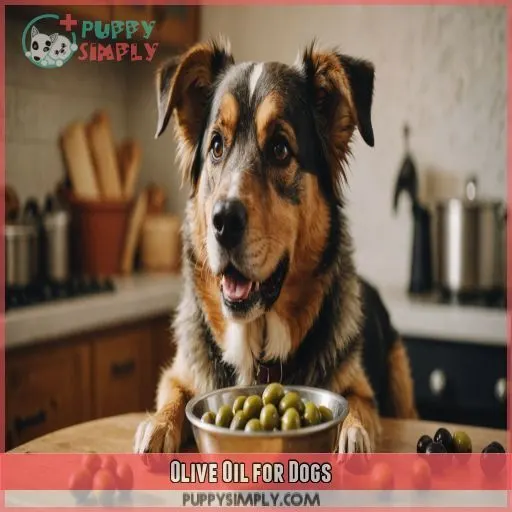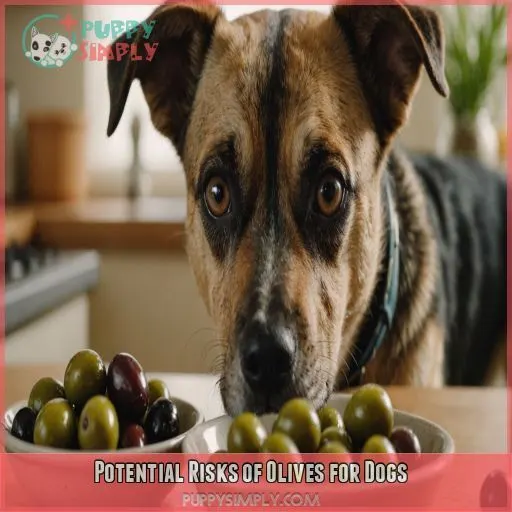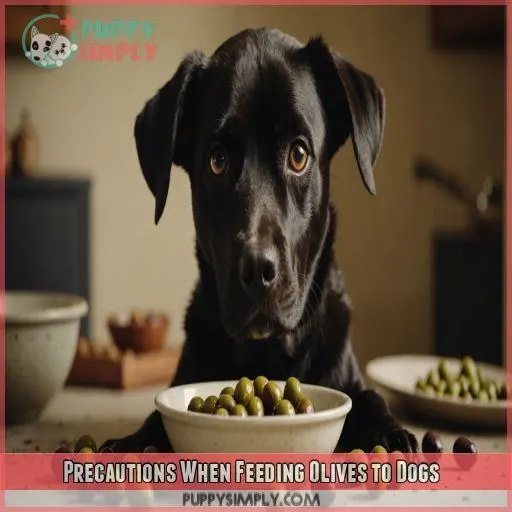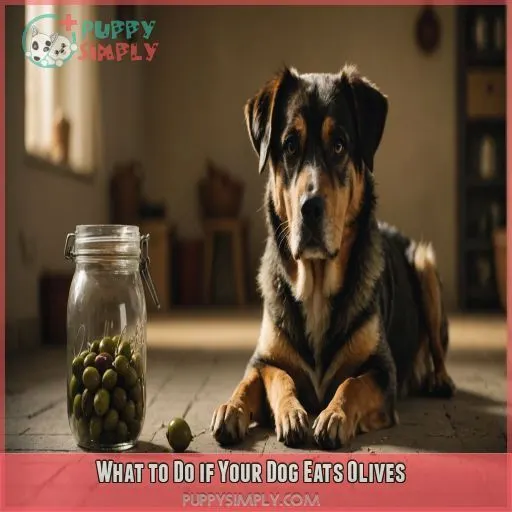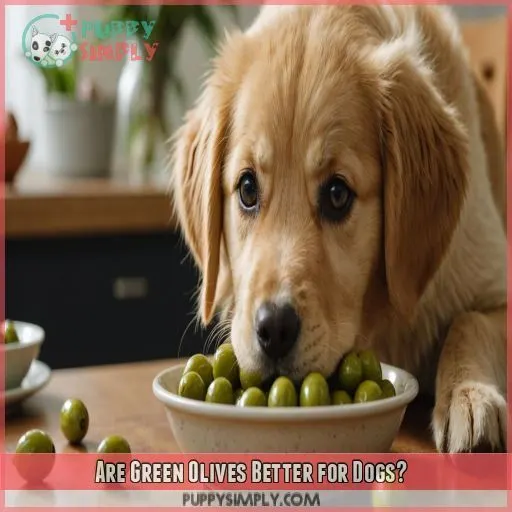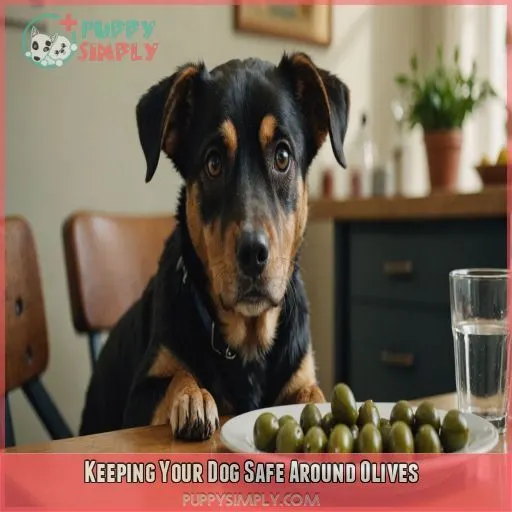This site is supported by our readers. We may earn a commission, at no cost to you, if you purchase through links.
 Yes, dogs can eat olives in moderation.
Yes, dogs can eat olives in moderation.
Plain, unsalted black or green olives without pits are generally safe for dogs and can even offer some health benefits due to their nutritional content.
However, it’s important to be cautious as there are potential risks associated with feeding olives to dogs.
Stay tuned to learn more about the benefits and risks of olives for your dog, as well as some safe alternatives.
Table Of Contents
- Key Takeaways
- Can Dogs Eat Olives?
- Are Olives Toxic to Dogs?
- Safe Olive Varieties for Dogs
- Olive Oil for Dogs
- Potential Risks of Olives for Dogs
- Precautions When Feeding Olives to Dogs
- What to Do if Your Dog Eats Olives
- Can Dogs Eat Olives With Pimento?
- Are Green Olives Better for Dogs?
- Keeping Your Dog Safe Around Olives
- Frequently Asked Questions (FAQs)
- Conclusion
Key Takeaways
- Olives are generally safe for dogs to consume, but only in moderation and if they are plain, unsalted, and pitted.
- There are some nutritional benefits to olives, but the high-fat content can lead to weight gain and other health issues in dogs.
- Olive pits pose a serious choking hazard and can cause intestinal blockages or dental damage.
- Canned, pickled, or flavored olives often contain high levels of sodium and other ingredients that may be harmful to dogs, so it’s best to stick to plain, unsalted varieties.
Can Dogs Eat Olives?
You might be wondering if it’s safe to share your favorite snack with your furry friend. Well, the short answer is yes, dogs can eat olives, but there are some important things you need to know before you offer them this tasty treat.
Olives can be a safe and healthy snack for dogs, but only in moderation and if prepared correctly. Let’s take a closer look at the benefits and risks of feeding olives to your dog.
The Benefits and Risks of Olives for Dogs
Olives have their pros and cons for dogs. The good news is that plain, unsalted olives are generally safe for dogs in small amounts. They offer some healthy fats and proteins, and even a few antioxidants and vitamins. But let’s be real, your pup doesn’t need extra nutrients if they’re already on a balanced diet.
Now, for the not-so-good news. Olives can lead to weight gain, especially if your furry friend overindulges. The pits are a major choking hazard and can cause intestinal blockages or even crack their teeth. Yikes! Canned or pickled olives are often loaded with sodium, which can lead to dehydration and sodium toxicity.
Nutritional Value of Olives for Dogs
Olives are a nutritional powerhouse.
They’re packed with heart-healthy monounsaturated fats, antioxidants, and vitamin E, which supports skin and eye health.
Plus, they’re a low-calorie, low-carb snack with a good amount of fiber to keep your dog’s digestion on track.
But don’t get too excited—these benefits are only noticeable if your dog eats a lot of olives, which isn’t recommended due to the high-fat content.
Are Olives Toxic to Dogs?
So, are olives toxic to dogs? The short answer is no, but there’s more to it. Olives themselves aren’t poisonous, but there are some serious risks you need to know about before feeding your pup any.
The Dangers of Olive Pits
While olives themselves aren’t toxic to dogs, their pits are a whole other story. These bad boys pose a serious choking risk and can cause intestinal blockages if swallowed. Not to mention, they’re a dental disaster waiting to happen. Just one chomp on a pit can leave your pup with a cracked tooth.
The Risks of Canned and Pickled Olives
Plain, unsalted olives are generally safe for dogs in moderation.
You need to be cautious about the sodium content in canned and pickled varieties.
These processed olives often contain high levels of sodium, which can be harmful to your furry friend.
Excessive sodium intake can lead to dehydration and even sodium toxicity.
Safe Olive Varieties for Dogs
When it comes to olives, not all varieties are created equal for our furry friends. While black and green olives are generally safe for dogs, it’s important to steer clear of those packed in oil, alcohol, or spiced up with garlic, onions, or shallots.
Black Olives and Green Olives
If you’re wondering about olives and your dog, you might be curious if black olives or green olives are better. Here’s the deal:
- Black olives (which are actually ripened green olives) and green olives are both generally safe for dogs in moderation.
- The key is to choose plain, pitted olives without any added ingredients.
- Make sure to avoid olives packed in oil, alcohol, or with added spices.
- Always opt for unsalted or low-sodium options to keep your pup’s sodium intake in check.
- Keep an eye on portion sizes, as even these safe varieties can contribute to weight gain if overindulged.
Avoiding Olives With Garlic, Onions, or Shallots
While black and green olives are generally safe for dogs, you’ve gotta be careful with the added extras. Olives stuffed with garlic, onions, or shallots are a no-go. These ingredients can cause red blood cell damage in dogs, leading to serious health issues.
Olive Oil for Dogs
You might be wondering if olive oil is a healthier alternative to olives for your furry friend. While it’s generally safe for dogs, there are some important things to keep in mind.
Is Olive Oil Safe for Dogs?
Olive oil is generally safe for dogs, but there are some important considerations:
- It’s rich in antioxidants and healthy fats, with potential health benefits.
- However, it’s high in calories and fat, so it can lead to weight gain and digestive issues if overconsumed.
- The high fat content can also trigger pancreatitis, so moderation is key.
- Always consult your vet before adding olive oil to your dog’s diet for personalized advice.
Using Unflavored Olive Oil Only
If you’re considering olive oil for your dog, there are a few things to keep in mind.
Always use unflavored olive oil.
Flavored varieties can contain ingredients that are toxic to dogs, so stick to the plain stuff.
While olive oil is generally safe for dogs in moderation, it’s high in fat and calories, so it’s not something you’d want to give your dog regularly.
A little drizzle on their food now and then is fine, but don’t deep-fry their treats in it.
Potential Risks of Olives for Dogs
While olives may be a tasty treat for humans, they can pose some serious health risks for our furry friends. From choking hazards to weight gain and even pancreatitis, there are several potential dangers to keep in mind before offering your dog this salty snack.
Choking Hazard and Dental Damage
Olives with pits can be a choking hazard for dogs, especially smaller breeds. Always opt for pitted olives or remove the pits yourself before sharing. Even large breeds can choke on olive pits, so keep an eye on your pup.
Olive pits can also crack teeth. If your dog loves to chew, stick to dedicated dog chew toys instead.
Weight Gain and Pancreatitis
Olives are high in fat and calories, which can lead to weight gain and other health issues in dogs. Here are some potential risks associated with feeding olives to your furry friend:
- Weight Gain: Olives are calorie-dense, and their high-fat content can contribute to weight gain if consumed in excess. This is especially true for dogs, who require a balanced diet with appropriate portions.
- Pancreatitis: The high-fat content in olives can trigger pancreatitis, an inflammation of the pancreas, in dogs. This condition is painful and sometimes life-threatening.
- Stomach Upset: Some dogs may experience an upset stomach, vomiting, or diarrhea after consuming olives.
- Health Conditions: Consult your veterinarian before feeding olives to dogs with health conditions; the high-fat content may worsen certain issues.
Precautions When Feeding Olives to Dogs
When feeding your dog olives, you need to be careful to keep them safe and healthy. This means starting with small amounts, choosing pitted olives, and keeping in mind any health issues your dog might have.
Starting With Small Amounts
If you’re thinking about giving your furry friend olives, it’s important to start with small amounts to see how they react to this treat. Remember, moderation is key!
| Keyword | Explanation |
|---|---|
| Small amount | Start with a few olives to gauge your dog’s reaction. |
| Safe start | Gradually introduce olives to avoid any negative symptoms. |
| Gradual feeding | Monitor your dog’s tolerance and adjust the amount accordingly. |
Avoiding Olives for Dogs With Health Conditions
If your dog has health issues like kidney disease, heart problems, or pancreatitis, it’s best to avoid feeding them olives. Olives are high in fat and salt, which can aggravate these conditions. Always consult your vet first if you’re unsure about what treats are suitable for your dog’s unique health needs.
What to Do if Your Dog Eats Olives
If your dog gets into the olive jar, don’t panic. Monitor them closely for any signs of illness, such as vomiting, diarrhea, lethargy, or loss of appetite. If you’re concerned, contact your veterinarian for advice.
Monitoring for Signs of Illness
If your dog eats olives, keep an eye out for any signs of illness, such as vomiting, diarrhea, lethargy, or loss of appetite. These could indicate that your dog is having an adverse reaction to the olives.
Contacting Your Veterinarian
If your dog has consumed olives and you’re concerned about their health, it’s always best to contact your veterinarian for advice. They’ll be able to provide specific guidance based on your dog’s individual needs.
Here are some reasons to give your vet a call:
- Your dog is showing signs of illness, such as vomiting, diarrhea, lethargy, or loss of appetite.
- You’re unsure about the safety of the olives your dog consumed, especially if they contained pits, added ingredients, or were canned/pickled.
- You want recommendations for safe and healthy treat alternatives to olives.
Can Dogs Eat Olives With Pimento?
You might be wondering if it’s safe to share those olives stuffed with pimento with your furry friend. Well, let’s take a closer look! Let’s explore if pimento-stuffed olives are a paws-itively good or bad treat for your pup.
The Safety of Olives With Pimento
So, can dogs eat olives with pimento? The short answer is yes, they can. Pimento is simply a type of red pepper, and it’s not harmful to dogs in small amounts. But, as with plain olives, you should only give your dog olives with pimento occasionally and in moderation.
Avoiding Olives With Toxic Ingredients
While olives themselves are non-toxic to dogs, certain ingredients commonly found in olive recipes can be harmful.
Olives stuffed with garlic, onions, or shallots are a no-go. These ingredients can cause red blood cell damage in dogs.
Also, avoid olives soaked in alcohol. Alcohol is toxic to dogs and can lead to serious health issues.
When in doubt, stick to plain, pitted black or green olives, and always consult your vet if you’re unsure.
Are Green Olives Better for Dogs?
You might wonder if green olives are a healthier option for your pup. After all, they’re a staple in Mediterranean cuisine, but are they safe for canine consumption? Let’s find out.
There’s no need to play favorites when it comes to olive color. The truth is, both green and black olives share similar nutritional profiles and potential risks for dogs. So, whether your furry friend is eyeing the green or black variety, it’s important to exercise caution.
The Similarities Between Green and Black Olives
There’s no big difference in how safe green and black olives are for dogs.
Both types are high in fat and salt, so it’s best to keep an eye on how many your dog eats.
Green olives are just unripe black olives, so the ripening process doesn’t change how safe they are or their nutritional value.
Avoiding Olives With Added Ingredients
While olives themselves aren’t toxic to dogs, added ingredients can be harmful. Here’s what you need to watch out for:
- Garlic, Onions, and Shallots: These ingredients can cause red blood cell damage in dogs and are often used in Mediterranean dishes.
- Alcohol: Alcohol is toxic to dogs, so never feed your pup olives soaked in booze.
- Spices and Seasonings: While not necessarily toxic, spices can irritate your dog’s stomach and cause digestive issues.
Keeping Your Dog Safe Around Olives
So, can your dog eat olives? The short answer is yes, but with some serious caveats. Olives aren’t toxic to dogs, but they’re also not a healthy treat. Keep reading to discover how to keep your furry friend safe.
Storing Olives Out of Reach
Now that you know the ins and outs of feeding olives to your furry friend, it’s time to talk about kitchen hazards and keeping those tasty treats away from prying paws. Olives are a tempting treat for curious canines, so it’s important to keep them stored safely out of reach.
Make sure to keep the olive jar or container on a high shelf or in a closed pantry. This simple step can prevent your pooch from helping themselves to a salty snack when you’re not looking. It’s a dog-eat-dog world out there, and those olives won’t stand a chance against a determined pup!
Choosing Healthy Treat Alternatives
There are plenty of dog-friendly snacks that make for healthier alternatives to olives.
Consider giving your furry friend baby carrots, apple slices, or some peanut butter on a toy instead.
You can even get creative and make your own homemade treats with dog-safe ingredients like pumpkin puree, sweet potatoes, or bananas.
Always opt for low-calorie, nutrient-rich options to keep your pup happy and healthy.
Frequently Asked Questions (FAQs)
Are black olives safe for dogs to eat?
Black olives won’t kill your dog, but they’re not a healthy treat either. High in fat and salt, they can cause weight gain and pancreatitis. Stick to plain, unsalted olives in moderation, and avoid the pits!
Can dogs eat olives with pimento?
Yes, dogs can eat olives stuffed with pimentos, but only if pimentos are the only added ingredient. Avoid olives with garlic, onion, or cheese.
What foods are toxic to dogs?
Foods that are toxic to dogs include alcohol, avocado, macadamia nuts, grapes, raisins, chocolate, fatty meats, and foods containing xylitol.
Can dogs eat pickles?
Dogs can eat a small amount of pickles without harm, but pickles are high in sodium and contain garlic, which is toxic to dogs. Too many pickles can cause vomiting, diarrhoea, seizures, and high blood pressure.
Can dogs eat olives with garlic?
No, dogs shouldn’t eat olives with garlic. Garlic is toxic to dogs and can cause red blood cell damage. Stick to plain, pitted black or green olives in moderation.
Are black olives safe for dogs?
Black olives are safe for dogs, but they’re high in sodium, so limit your dog to one or two black olives once or twice a week. Always remove the pits to prevent choking.
Are olives bad for dogs teeth?
Olives themselves won’t damage your dog’s teeth, but the pits are hard and sharp, and can chip or crack them. Always remove pits before giving olives to your dog.
Can dogs eat marinated olives?
Marinated olives are a no-go for dogs. They often contain garlic, onions, and seasonings, which are harmful to dogs. Opt for plain, unsalted olives instead.
Can dogs eat olives with pimiento?
Yes, dogs can eat pimiento-stuffed olives, but only if pimientos are the only added ingredient. Keep portions small and always check for pits, which can cause choking. Canned pimiento-stuffed olives may contain high amounts of sodium and artificial preservatives, which can be harmful.
Conclusion
So, can dogs eat olives? Absolutely, but only the plain, unsalted kind and in moderation.
While olives offer some health benefits due to their nutritional content, there are also potential risks involved.
The key is to be mindful of the type of olive, avoid harmful additives, and make sure your dog doesn’t gobble down the pit.
Now you’re equipped with the knowledge to understand olives and keep your furry friend safe and healthy.




